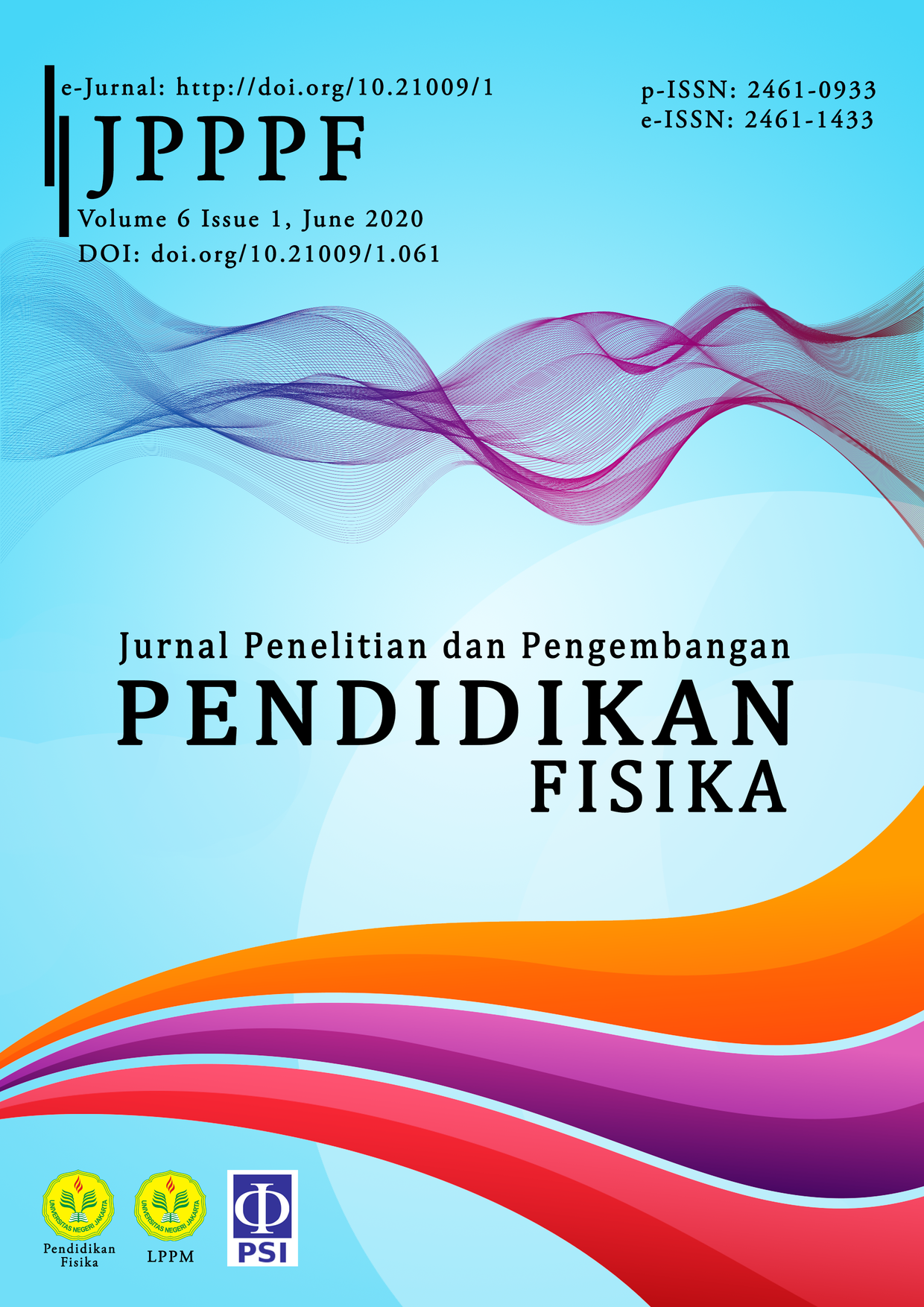The Experimental Study of Kinesthetic Style Student Learning Outcomes in Remedial Teaching Assisted by Projectile Motion Props
DOI:
https://doi.org/10.21009/1.06104Keywords:
kinesthetic style, learning outcomes, projectile motion, projectile motion props, remedial teachingAbstract
The main problem of this study is that students who are not able to gain the minimum score were not given remedial teaching and learning that were adjusted to their learning style. This study aimed to determine the effect, improvement, and effectiveness of the use of projectile motion props in remedial teaching on kinesthetic style students learning outcomes and students’ response to the use of the props. The research method used in this study was a quasi-experiment with nonequivalent control group design. Hypothesis test results of the post-test results with the Mann-Whitney U test at the confidence level of 95% (α = 0.05) obtained the significance value (2-tailed) that was 0.000. Alternative research hypotheses (H1) were accepted (there were effects of projectile motion props on remedial teaching on kinesthetic style student learning outcomes). The kinesthetic style student in the experimental group successfully gained 0.64 (middle category) in their learning outcomes, and the controlled group students gained less only 0.31 (middle category) in their learning outcomes. In the cognitive domain of C2 (understanding), the experimental group students experienced the highest increase, which was 0.72, while the controlled group gained only 0.50. The effectiveness of remedial teaching in the experimental group was very effective (80%); meanwhile, in the controlled group, it showed ineffectiveness (28%). Students of kinesthetic style’s response are very good (81%) on the use of projectile motion props.
References
Anas, M 2014, Alat peraga dan media pembelajaran, Muhammad Anas.
Awang, H, Samad, NA, Faiz, NM, Roddin, R & Kankia, JD 2017, ‘Relationship between the learning styles preferences and academic achievement’, IOP Conference Series: Materials Science and Engineering, vol. 226, no. 1, p. 012193.
Bukhari, B 2017, ‘Penerapan pengajaran remedial terhadap peningkatan hasil belajar siswa pada pokok bahasan ikatan ion dan ikatan kovalen’, Jurnal Dedikasi Pendidikan, vol. 1, no. 1, pp.11-20.
Darmadi, H 2017, Pengembangan model dan metode pembelajaran dalam dinamika belajar siswa, Deepublish, Yogyakarta
Direktorat Pembinaan SMA 2010, Juknis Pembelajaran Tuntas, Remedial, dan Pengayaan di SMA, Depdikbud.
Fleming, ND & Mills, C 1992, ‘Not another inventory, rather a catalyst for reflection’, To improve the academy, vol. 11, no. 1, pp.137-155.
Jangid, N & Inda, US 2016, ‘Effectiveness of remedial teaching on thinking strategies of slow learners’, The International Journal of Indian Psychology, vol. 4, no.1, p. 84.
Kementrian Pendidikan dan Kebudayaan 2016, Silabus mata pelajaran sekolah menengah atas/madrasah aliyah (SMA/MA) mata pelajaran fisika, Kemdikbud, Jakarta.
Khongpit, V, Sintanakul, K & Nomphonkrang, T 2018, ‘The VARK learning style of the university student in computer course’, International Journal of Learning and Teaching, vol. 4, no. 2.
Meltzer, DE 2002, ‘The relationship between mathematics preparation and conceptual learning gains in physics: A possible “hidden variable” in diagnostic pretest scores’, American journal of physics, vol. 70, no. 12, pp. 1259-1268.
Mishbahah, P 2017, ‘Pengembangan alat peraga percobaan melde sebagai media pembelajaran fisika pada materi gelombang stasioner’, Jurnal Inovasi Pendidikan Fisika (JIPF), vol. 6, no 3, pp. 275-279.
Mukhtar, R 2007, Pengajaran remedial: Teori dan penerapannya dalam pembelajaran, Nimas Multima, Jakarta.
Nafisah, D, Sulhadi, S & Yulianti, D 2018, ‘Pembelajaran fisika berbantuan alat peraga proyektor smartphone untuk meningkatkan pemahaman konsep optik pada siswa SMP’, UPEJ Unnes Physics Education Journal, vol. 7, no. 1, pp. 74-80.
Nurlia, N, Hala, Y, Muchtar, R, Jumadi, O & Taiyeb, M 2017, ‘Hubungan antara gaya belajar, kemandirian belajar, dan minat belajar dengan hasil belajar biologi siswa’, Jurnal Pendidikan Biologi, vol. 6, no. 2, pp. 321-328.
Othman, N & Amiruddin, MH 2010, ‘Different perspectives of learning styles from VARK model’, Procedia-Social and Behavioral Sciences, vol. 7, pp. 652-660.
Pribadi, BA 2011, Model assure untuk mendesain pembelajaran sukses, Dian Rakyat, Jakarta.
Putri, SE 2019, ‘Pengaruh alat peraga gerak parabola pada remedial teaching terhadap hasil belajar siswa kinesthetic style’, Bachelor's thesis, Repisitori UIN Syarih Hidayatullah Jakarta.
Saepuzaman, D, & Karim, S 2016, ‘Desain pembelajaran student’s conceptual construction guider berdasarkan kesulitan mahasiswa calon guru fisika pada konsep gerak parabola’, Jurnal Penelitian & Pengembangan Pendidikan Fisika, vol. 2, no. 2, pp. 79-86.
Silitonga, FS 2018, ‘The using of peer tutoring learning method in improving student’s understanding’, First Indonesian Communication Forum of Teacher Training and Education Faculty Leaders International Conference on Education 2017, pp. 183-186.
Suwarna, IP 2016, ‘Pengembangan instrumen ujian komprehensif mahasiswa melalui computer based test pada program studi pendidikan fisika’, Bachelor's thesis, Repisitori UIN Syarih Hidayatullah Jakarta.
Wicaksana, A 2017, ‘Pengembangan Alat Peraga Pada Materi Gerak Parabola Untuk Melatih Keterampilan Proses Sains Siswa (Bachelor's thesis)’, Bachelor's thesis, Repisitori UIN Syarih Hidayatullah Jakarta.
Widianingtiyas, L, Siswoyo, & Bakri, F 2015, ‘Pengaruh pendekatan multi representasi dalam pembelajaran fisika terhadap kemampuan kognitif siswa SMA’, Jurnal Penelitian &Pengembangan Pendidikan Fisika, vol. 1, no. 1, pp. 31-38.
Yaumi, M 2018, Media dan Teknologi Pembelajaran, Prenada Media, Jakarta.
Zulfiani, Z, Suwarna, IP & Miranto, S 2018, ‘Science education adaptive learning system as a computer-based science learning with learning style variations’, Journal of Baltic Science Education, vol. 17, no. 4, pp. 711-727.
Zulfiani, Z, Suwarna, IP & Miranto, S 2019, ‘ScEd-ALS Project: The use of pedagogical intervention in developing hypermedia science based on learning style’, Empowering Science and Mathematics for Global Competitiveness: Proceedings of the Science and Mathematics International Conference (SMIC 2018), November 2-4, 2018, Jakarta, Indonesia, pp. 223-232.











